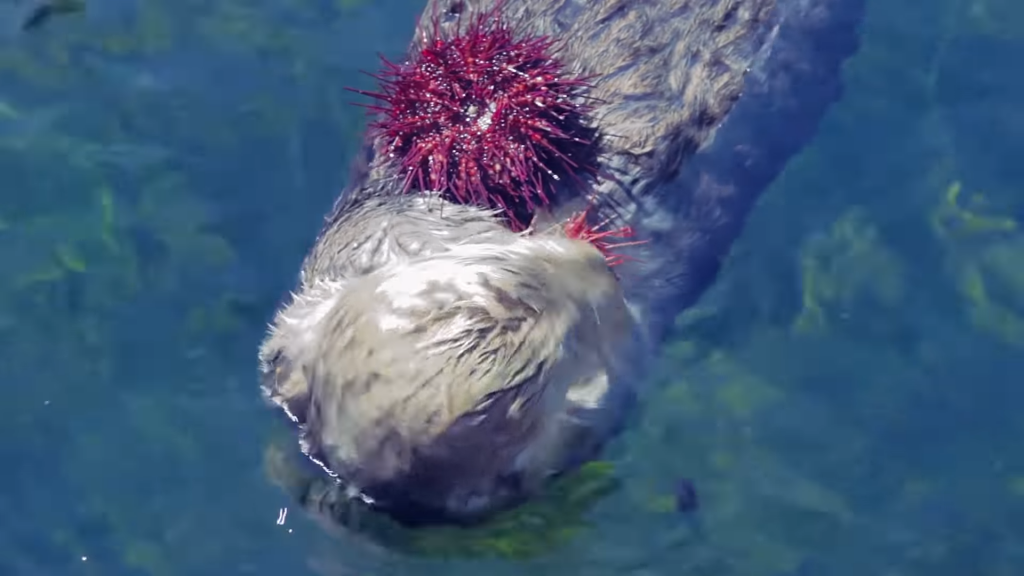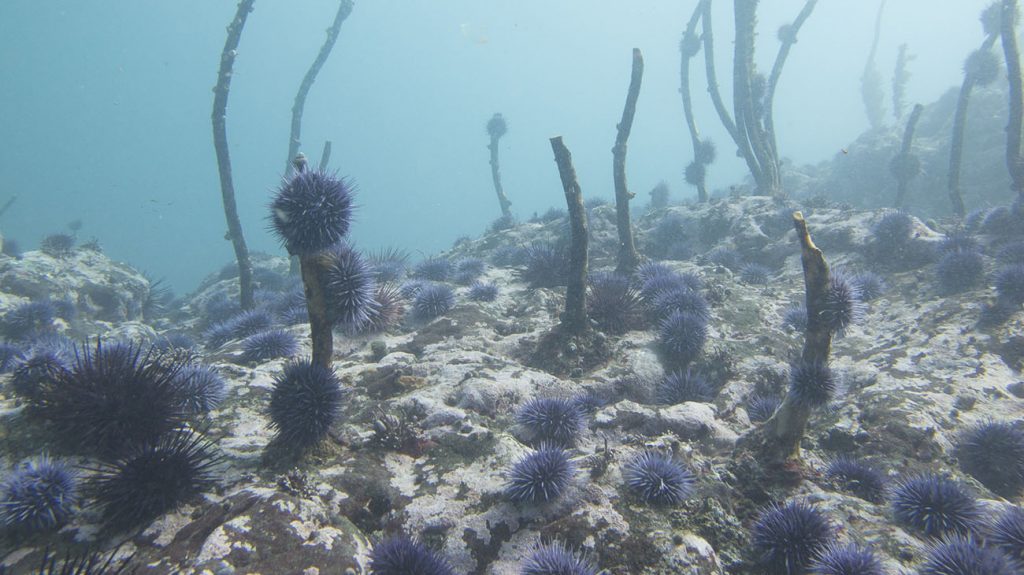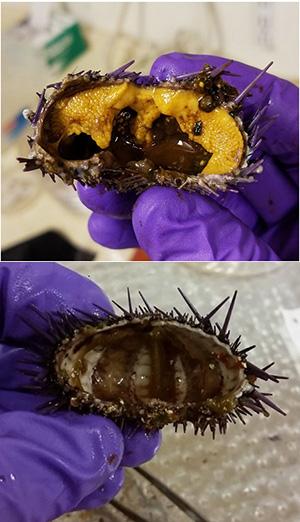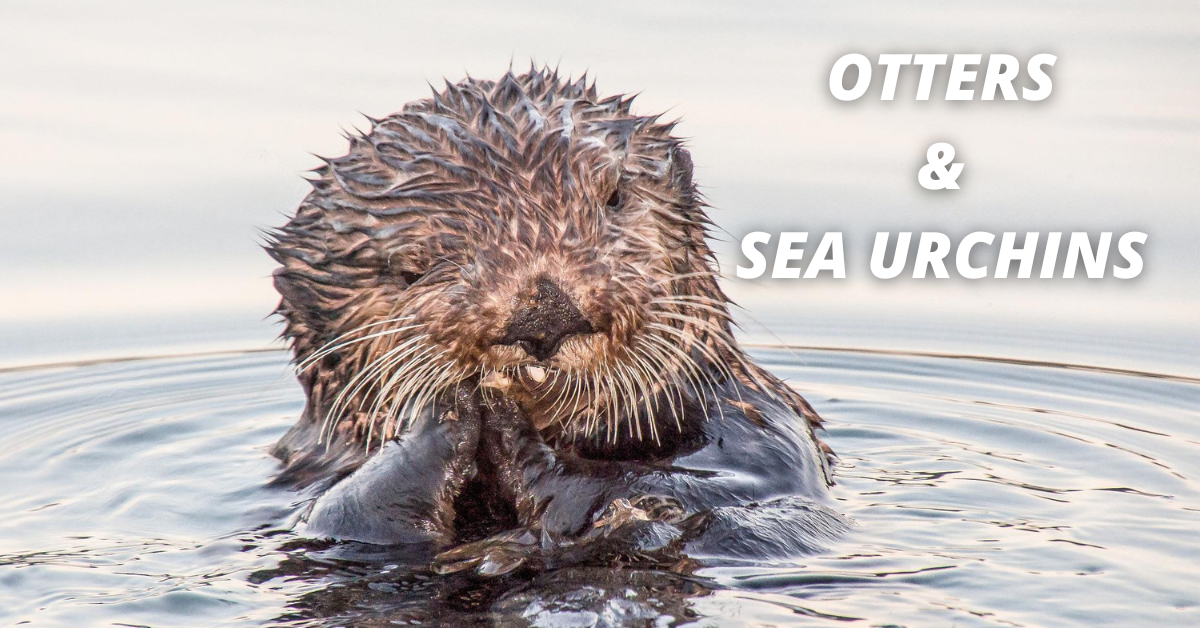Yes, otters do eat sea urchins. In fact, they are known to be one of the few animals that can consume these spiny creatures without getting injured. But why do they eat sea urchins? And how?
We’ll be exploring many different topics surrounding sea otters and the sea urchin, including why sea otters can help fight global warming.
Table of Contents
Do Otters Eat Sea Urchins?: What Research Says
There is some research suggests that otters may actually prefer sea urchins as a food source. One study found that when given a choice between eating an urchin or a crab, otters overwhelmingly chose to eat the urchin (by a margin of 3-to-1).
It is thought that the reason for this preference is that urchins are a more calorie-rich food source than crabs. This is important for otters, as they have a very high metabolism and must consume a lot of calories to maintain their body weight.
How Do Otters Eat Sea Urchins?

Otters are able to eat sea urchins by using their long, sharp claws to crack open the urchin’s shell. They then use their tongues to scrape out the urchin’s flesh.
Otters have been known to use rocks as tools to help them crack open sea urchin shells. They will store the rocks in little pouches under their arms until they are ready to use them.
This interesting technique functions sort of like a hammer (the sea urchin or clam) banging against an anvil (the rock on the otter’s belly). Most otters will learn this unique behavior from their mothers; however, in certain areas where prey isn’t as hard to force open, otters opt to use their claws or teeth to eat.
Funnily enough, otters living in captivity have shown the ability to perform this action as well. Cracking ice instead of sea urchins.
Do river otters eat sea urchins?
No. River otters eat fish, crustaceans, mollusks, amphibians, and reptiles. Also, as the name implies, river otters are freshwater creatures, while sea urchins are saltwater.
Sea otters are the type of otter that eats sea urchins.
Why Are Sea Otters Important?
Otters are important because they are a “keystone species.” Essentially, they help the local wildlife around them with their actions.
Sea otters do this by preying on sea urchins, which are grazers upon kelp. Kelp forests are incredibly important for other underwater creatures which use the kelp for food and shelter. Without sea otters, biodiversity in the environment would decrease drastically. As shown by the effect on local marine wildlife once the sea otter population was reduced (largely) by human overhunting.
The research on sea otters is quite clear.
What Would Happen If There Were No Otters?

If there were no otters, the sea urchin population would increase unchecked and result in the overgrazing of kelp forests. This would have a ripple effect throughout the nearshore ecosystem, leading to decreased biodiversity.
A lot of research has been conducted on what would happen if there were no sea otters. And the results are not good.
In addition to the loss of kelp forests, other animals would also be affected. For example, studies have shown that without sea otters, abalone populations would collapse. This is because sea urchins love to eat kelp, the main food source of both species. Sadly, abalones don’t have the ability to survive as long as sea urchins do without food. Therefore, the urchins would quickly decimate the abalone.
This would have a domino effect on the local ecosystem, as abalone is a food source for many animals, including humans.
The loss of sea otters would also lead to an increase in carbon dioxide emissions. This is because kelp forests play a big role in absorbing carbon dioxide from the atmosphere.
In short, the loss of sea otters would be devastating to both the local environment and the planet as a whole.
Other aquatic keystone species:
- Sea lions
- Sharks
- Bald eagles
- Humpback whales
- Salmon
Weird Problem With Sea Urchins
Sea urchins are important for the health of coral reefs, but they can also cause problems.
An overabundance of sea urchins can result in something called “urchin barrens.” This is when an area is completely stripped of all kelp by the urchins grazing. The problem with urchin barrens is that they are incredibly difficult to reverse.
Once an area has been turned into an urchin barren, it can take years for the kelp to grow back. And even then, the kelp may not be as dense as it was before. This is because urchins tend to eat the taller, faster-growing kelp first.
Urchin barrens can have a big impact on the local ecosystem. This is because kelp forests provide food and shelter for many animals. When the kelp is gone, these animals are left without a home.
Human solutions to this have been to try and eat them. We’ve shown that we can drive organisms to extinction without even trying, so why not attempt to cull a detrimental creature for once? Urchin roe or “uni” is our delicious attempt.

Bottom: starved sea urchin
Well, sea urchins have proven to be not only resilient to aging, but also quite good at being an unappealing meal. When there is no kelp for a sea urchin to graze on, they slowly start to lose their gonads and therefore become useless for consumption.
Not only do humans not want to eat starved sea urchins, but sea otters that otherwise would go for a tasty sea urchin avoid them in search of less barren prey. But once a sea urchin starts eating kelp and regrowing its gonads, it is right back on the sea otter’s menu.
In short: sea otters are very important for the sea urchin problem.
Do Otters Eat Sea Urchins?: The Conclusion
So, do otters eat sea urchins? Yes, they most certainly do! Not only that, but they may even prefer them as a food source due to their high-calorie content. So next time you see an otter munching on a sea urchin, know that they’re not only satisfying their hunger but also helping to keep the nearshore ecosystem in balance.


